Informing Management of Waterfowl Harvest in a Changing Climate

Project Information
Principal Investigator: Michael Runge, USGS Patuxent Wildlife Research Center
Project Completed: June 2023
Implements Science Plan Theme: Adaptation
Project Cooperators: Patrick K. Devers (US FWS), G. Scott Boomer (US FWS), James E. Lyons (USGS Patuxent Wildlife Research Center), Anna M. Tucker (USGS Patuxent Wildlife Research Center), Qing Zhao (University of Missouri)
Overview
Our ability to effectively manage wildlife in North America is founded in an understanding of how our actions and the environment influence wildlife populations. Current practices use population monitoring data from the past to determine key ecological relationships and make predictions about future population status. In most cases, including the regulation of waterfowl hunting in North America, these forecasts assume that the environmental conditions observed in the past will remain the same in the future. However, climate change is influencing wildlife populations in many dynamic and uncertain ways, leading to a situation in which our observations of the past are poor predictors of the future. If we continue to use the existing framework to set waterfowl hunting regulations without accounting for climate change, there is the potential for under- or over-harvesting which would negatively affect waterfowl populations and hunters across North America.
This project laid the theoretical groundwork for incorporating climate change projections into the current adaptive harvest management frameworks used to set U.S. hunting regulations for North American waterfowl. We developed an optimization tool that allowed us to evaluate the potential costs of continuing to use existing models to inform hunting regulations despite evidence of climate change effects on populations. We are finalizing an analysis of the properties of a policy that accounts for climate change, which will determine the net benefits of implementing such a policy. Once this analysis is complete, we will produce a guidance document that summarizes our current knowledge about the effects of climate change on waterfowl populations, and the steps needed to implement a policy. This work directly supports the U.S. Fish and Wildlife Service in their role setting hunting regulations, ensuring sustainable harvest opportunities of these public trust species.
